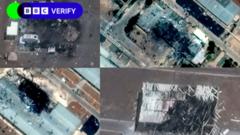The ongoing military confrontation between Israel and Iran escalated dramatically over the weekend, with both nations launching significant retaliatory strikes. As air raid sirens blared in cities across Israel, missiles penetrated neighborhoods, leading to civilian casualties and widespread destruction.
**Escalating Tensions: Israel Intensifies Strikes on Iranian Targets Amid Missile Exchanges**

**Escalating Tensions: Israel Intensifies Strikes on Iranian Targets Amid Missile Exchanges**
Fears of a broader conflict grow as Israel and Iran launch significant attacks on each other, with missile strikes and bombings causing destruction and casualties on both sides.
Israel began its assault on Iranian military sites on Friday, aiming at key installations linked to Iran's nuclear program and military capabilities. This included the Mehrabad International Airport and strategic air defense locations. Israeli air defenses successfully intercepted many incoming missiles, as Jerusalem lit up with flares from the interceptors in action.
Reports indicate that over 70 individuals have lost their lives in Iran due to these Israeli assaults, which have also seemingly compromised Tehran's air defense capabilities. The city witnessed extensive explosions, particularly centered around oil and gas facilities, including the Shahran fuel depot, which was reported to be ablaze.
In response, Iran manufactured a series of missile retaliations, targeting major urban areas in Israel, including Tel Aviv and Haifa, leading to injuries and fatalities among Israeli civilians. The rockets have raised alarms, compelling substantial segments of the civilian population to seek refuge in bomb shelters as explosions shook the vicinity.
Amid mounting chaos, residents in both countries express heightened fears and anxiety. For ordinary Iranians, the continuous strikes have led to fires in urban centers, causing panic among the population. Witnesses describe the clamor of explosions likened to an earthquake, as they scramble to heed public warnings.
International reactions to the intensifying situation remain largely focused on diplomatic channels. The United States, while not directly involved in the military operations, is reportedly repositioning military assets in the region to provide support and ensure protection for its personnel. Meanwhile, Russia's President Vladimir Putin condemned the Israeli attacks during a recent conversation with U.S. President Trump, emphasizing the need to prevent further escalation and highlight the importance of remaining focused on the Iran nuclear discussions.
The multifaceted conflict poses unprecedented challenges not only for the Middle East but for global markets, especially as prices for oil are expected to rise amidst fears of supply chain disruptions. The strategic targets targeted by Israeli forces underline the vulnerability of Iran's critical energy infrastructure, which has far-reaching implications for the geopolitical landscape moving forward.
The continuous cycle of retaliation raises pressing concerns about a potential broader regional conflict assignment as both nations maintain their vehement stances and efforts to assert dominance in the ongoing hostilities. As both cities brace for another tumultuous night, the need for diplomatic intervention begins to echo loudly above the cacophony of war.
Reports indicate that over 70 individuals have lost their lives in Iran due to these Israeli assaults, which have also seemingly compromised Tehran's air defense capabilities. The city witnessed extensive explosions, particularly centered around oil and gas facilities, including the Shahran fuel depot, which was reported to be ablaze.
In response, Iran manufactured a series of missile retaliations, targeting major urban areas in Israel, including Tel Aviv and Haifa, leading to injuries and fatalities among Israeli civilians. The rockets have raised alarms, compelling substantial segments of the civilian population to seek refuge in bomb shelters as explosions shook the vicinity.
Amid mounting chaos, residents in both countries express heightened fears and anxiety. For ordinary Iranians, the continuous strikes have led to fires in urban centers, causing panic among the population. Witnesses describe the clamor of explosions likened to an earthquake, as they scramble to heed public warnings.
International reactions to the intensifying situation remain largely focused on diplomatic channels. The United States, while not directly involved in the military operations, is reportedly repositioning military assets in the region to provide support and ensure protection for its personnel. Meanwhile, Russia's President Vladimir Putin condemned the Israeli attacks during a recent conversation with U.S. President Trump, emphasizing the need to prevent further escalation and highlight the importance of remaining focused on the Iran nuclear discussions.
The multifaceted conflict poses unprecedented challenges not only for the Middle East but for global markets, especially as prices for oil are expected to rise amidst fears of supply chain disruptions. The strategic targets targeted by Israeli forces underline the vulnerability of Iran's critical energy infrastructure, which has far-reaching implications for the geopolitical landscape moving forward.
The continuous cycle of retaliation raises pressing concerns about a potential broader regional conflict assignment as both nations maintain their vehement stances and efforts to assert dominance in the ongoing hostilities. As both cities brace for another tumultuous night, the need for diplomatic intervention begins to echo loudly above the cacophony of war.





















